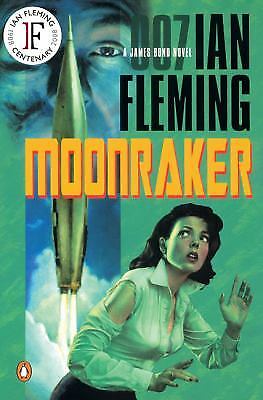

“Each dark conjecture came and for a moment settled like a vulture on Bond’s shoulder and croaked into his ear that he had been a blind fool.”
Partway through this book I thought it was my least favorite Bond novel thus far in the series, but it redeems itself with a solid middle portion and ending. It turns out that Fleming had an idea for a screenplay that was too short to adapt into a full novel, and so a seven chapter introduction was added. Once I got to the meat of the story, I found an engaging mystery unraveled by a grounded, mortal James Bond. Despite borrowing the title, the Moonraker film (released in 1979 and starring Roger Moore), is almost entirely different from the novel; instead of a missile program headed by an ex-Nazi, the film revolves around a new world order and a space shuttle, and features the return of beloved Bond villain Jaws after his debut appearance in The Spy Who Loved Me (1977).
In Casino Royale, the plot is centered around a high-stakes game of baccarat. Here, we open with seven chapters dedicated to what should be a mostly harmless game of bridge. I have never played either game, which likely precluded my enjoyment of the meticulous descriptions Fleming provides of them, and in the case of Moonraker, severely diminished my desire to continue with the book.
A multi-millionaire and national hero, Sir Hugo Drax has been regularly cheating at cards, and winning considerable sums, though none of his fellow players can put a finger on his method; they just know he wins too often for it to be luck. Bond, a trained card sharp himself, is brought in to assess the man, and using trickery of his own, wins a hefty sum of from Drax, hoping that the man has been taught his lesson.
In this excessively drawn out, chapters-long scene, we experience the more human Bond. He gets drunk and takes benzedrine, in an attempt to appear careless yet also remain alert enough to win the game. He makes rash decisions and regrets them immediately. His combination of depressant and stimulant does not work out quite as he planned, as he loses the tight control he usually exerts on his thoughts and actions, and he ups the ante on Drax considerably, betting more than a year of his salary.
He felt the prickle of sweat on his forehead. That damned benzedrine. And, for him of all people to allow himself to be needled by a blustering loud-mouthed bastard like Drax. And he wasn’t even on a job. The whole evening was a bit of a social pantomime that meant less than nothing to him. Even M. had only been dragged into it by chance. And all of a sudden he’d let himself be swept up into a duel with this multi-millionaire, into a gamble for literally all Bond possessed, for the simple reason that the man had got filthy manners and he’d wanted to teach him a lesson. And supposing the lesson didn’t come off? Bond cursed himself for an impulse that earlier in the day would have seemed unthinkable. Champagne and benzedrine! Never again.
At the end of the evening, he has sized up the man who will become the villain in the succeeding chapters. Drax has a mysterious background, even to himself, as he suffers from injury-induced amnesia from the war. He came home as a man free of any identity or obligation and immediately began building an empire, investing in columbite and establishing himself as a beloved public figure. Falling in line with the previous Bond villains, Drax is possessed of a physical ugliness to match his internal monstrosity. He has pioneered the titular long-range rocket, and after a murder-suicide occurs on the compound, Bond is coincidentally brought in to verify the security of the base for the impending test launch of the rocket.
The rocket is of interest to the UK due to its capability to strike any capital in Europe, namely Moscow. During the actual Cold War, England went so far as to fake tests of thermonuclear weapons to appear more powerful than they were, so their embrace and promotion of the Moonraker is at least somewhat realistic, and the charismatic entrepreneur seems a fairly apt archetype when reading the book in the 20th century. The rocket is described in poetic detail, and while Fleming’s writing style is intentionally undemanding, he obviously took great joy in researching the subjects that he included in his work.
It was like being inside the polished barrel of a huge gun.
From the floor, forty feet below, rose circular walls of polished metal near the top of which he and Drax clung like two flies. Up through the centre of the shaft, which was about thirty feet wide, soared a pencil of glistening chromium, whose point, tapering to a needle-sharp antenna, seemed to graze the roof twenty feet above their heads.
The shimmering projectile rested on a blunt cone of latticed steel which rose from the floor between the tips of three severely back-swept delta fins that looked as sharp as surgeons’ scalpels. But otherwise nothing marred the silken sheen of the fifty feet of polished chrome steel except the spidery fingers of two light gantries which stood out from the walls and clasped the waist of the rocket between thick pads of foam-rubber.
Bond works with Gala Brand, a Scotland Yard mole who has been undercover as Drax’s secretary since the start of the Moonraker project. Together, they uncover a conspiracy that would cripple their country. As per usual, Gala becomes an object of Bond’s desire. She is not treated as a child as Vesper was in Casino Royale, or as a pure sex object like Solitaire in Live and Let Die; however, she is a severely underdeveloped character, and is used mostly as a plot device—Bond must save her, she finds a clue for Bond that would have been unrealistic for Bond to find himself, etc.
Compared to the first two Bond novels, the theatrics are more subdued here. For instance, Bond does not engage an octopus in fisticuffs here. He is no longer the superhero of the first few novels. He is a man who makes mistakes, has hobbies and regrets and addictions. We knew from the first few novels that he smoked, drank, and enjoyed cards and women, but his passions provide more depth here; they are not just details but actually inform and affect his actions. This less flashy, more sophisticated protagonist is an intriguing character and I hope he returns in the next few books.